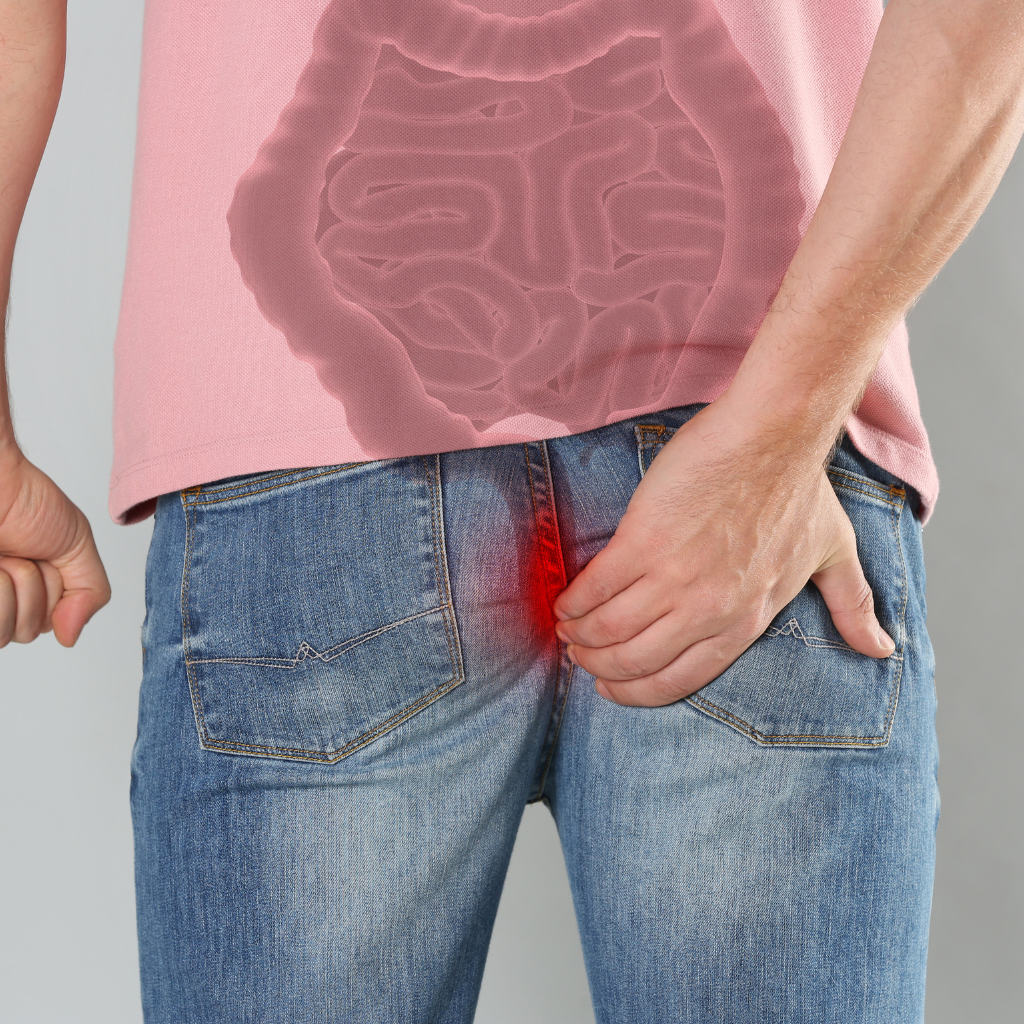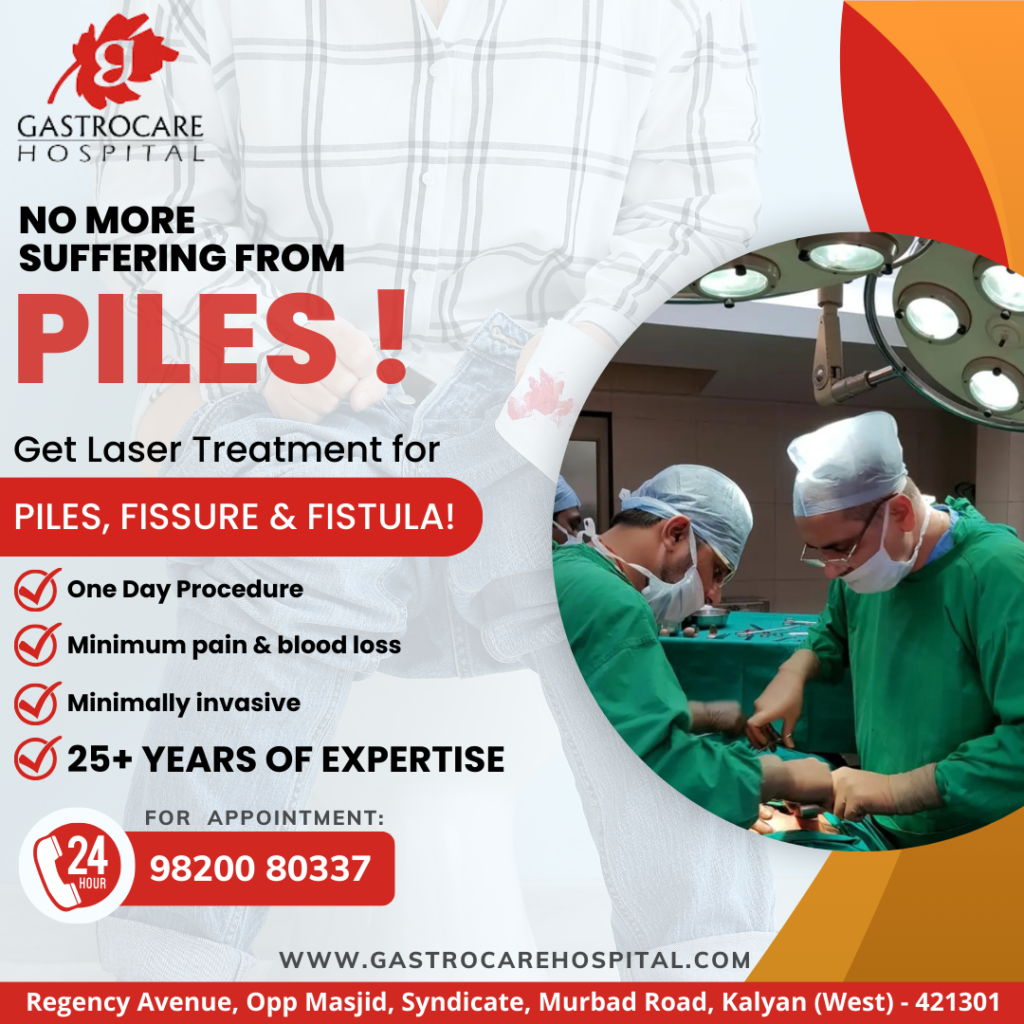Piles Treatment
- HOME
- PILES TREATMENT

PILES (HEMORRHOIDS)
Piles, also known as hemorrhoids, are swollen veins located around the rectum or in the anal canal. They can cause discomfort, pain, and sometimes bleeding during bowel movements. Understanding the symptoms, causes, and available treatments is essential for managing this condition effectively.
Symptoms of Piles (may vary person-to-person):
Piles, or hemorrhoids, often present with distinctive symptoms. These include rectal bleeding, noticeable as bright red blood on stool or toilet paper after a bowel movement. Additionally, the affected area around the anus may become itchy and inflamed, leading to discomfort. Pain, particularly during bowel movements or prolonged sitting, is also common. Swelling and sometimes painful lumps can develop around the anus due to piles. In certain cases, there may even be a discharge of mucus from the anus. These symptoms collectively characterize the condition, alerting individuals to seek appropriate medical attention.
What Causes Piles ?
Several factors can contribute to the development of piles, or hemorrhoids. Chronic constipation and the resultant straining during bowel movements are common culprits. Likewise, persistent diarrhea can also be a contributing factor. In women, the pressure on the pelvic area during pregnancy and childbirth can lead to the development of piles. Additionally, as individuals age, the supporting tissues around the rectum and anus may weaken, increasing the likelihood of piles. Conditions like obesity, which exert excess pressure on the pelvic area, can also elevate the risk. For some, genetic predisposition plays a role, making them more susceptible to piles. Finally, a sedentary lifestyle, characterized by a lack of physical activity and prolonged periods of sitting, can further contribute to the development of this condition.
Schedule Your Appointment !
Treatment Options:
Certainly! When it comes to the treatment of piles, individuals have two main options: Non-surgical and Surgical interventions.
Non-surgical treatments for piles include dietary adjustments, hydration, topical applications, sitz baths, and the use of stool softeners or laxatives. Increasing fiber intake from fruits, vegetables, and whole grains helps soften stool, reducing strain during bowel movements. Adequate hydration maintains soft stools and lowers the risk of constipation. Over-the-counter creams or ointments provide relief from itching, pain, and swelling. Warm sitz baths taken several times a day offer comfort and reduce inflammation. In some cases, stool softeners or laxatives can be used to alleviate constipation, making bowel movements more comfortable. These non-invasive approaches can be effective in managing piles.
Surgical Treatment for Piles:
-
Stapled Hemorrhoidopexy (PPH): PPH is a surgical procedure used to treat hemorrhoids. It involves using a circular stapler to remove excess tissue and reposition the remaining tissue to its normal position. This procedure is less invasive than traditional hemorrhoidectomy and typically involves less pain and faster recovery.
-
Laser Treatment for Hemorrhoids: Laser treatment for hemorrhoids is a minimally invasive procedure that uses laser energy to shrink the hemorrhoidal tissue. It’s often used for smaller, internal hemorrhoids. The laser helps promote tissue coagulation and reduces blood flow to the hemorrhoid, leading to its shrinkage.
-
Hemorrhoidectomy: Hemorrhoidectomy is a surgical procedure in which hemorrhoids are surgically removed. It is typically reserved for severe or recurrent cases of hemorrhoids. The procedure involves the excision of the hemorrhoidal tissue and is effective in providing long-term relief from symptoms.
Each of these treatments serves as an option for managing hemorrhoids, and the choice between them depends on factors like the severity of the condition, the type and size of the hemorrhoids, and the patient’s overall health. Consulting a healthcare professional is crucial in determining the most suitable treatment approach for each individual case.

FAQs
Yes, adopting a high-fiber diet, staying hydrated, and avoiding prolonged sitting or straining during bowel movements can help prevent piles.
No, surgery is typically considered if non-surgical treatments are ineffective or in severe cases of piles.
With proper lifestyle changes and management, the risk of recurrence can be minimized. However, some individuals may experience recurrent episodes.
Recovery time varies depending on the type of surgery and individual factors. It can range from a few days to a few weeks.
While piles themselves are not usually indicative of a serious condition, they can cause significant discomfort. If you experience persistent symptoms, it’s important to consult a healthcare professional for proper evaluation and treatment.
Trustindex verifies that the original source of the review is Google. Dr.yogesh palshetkar sir is very patient and listen all health issues very politely and give more time and don't tell to do any no needed medical test .all staff is also respectfull nurses and reception madam .Trustindex verifies that the original source of the review is Google. Best service given of cashless mediclaim facility with hassle free cashless claim by Miss.Anshula from mediclaim department Thanks for her support and coordination she is a gem of a person...and was waiting till approval .... Thanks to hospital tooTrustindex verifies that the original source of the review is Google. Iam sharing my personal experience with this hospital after 3 months of surgery of my younger brother....my brother's appendix laperoscopic surgery done by DR. YOGESH PALSHETKAR Sir , who is excellent in his practice with the experience of more than 25 yrs, very smoothly he done the operation within 3 days discharged and patiient is ok till now no pain, no discomfort. Hospital staff is polite, all nurses & mavashi's are very caring. I specially want to thank ANSHULA Madem who done the Cashless procedure very easy for us. Thank you all team of Gastrocare kalyan. I recommend this hospital to all of you.Trustindex verifies that the original source of the review is Google. Great experience with Gastrocare hospital, the staff is very supportive, doctor is very helpful they will explain everything and all the treatment options for your problem. Also, special thanks to Anshula Mam, who took lot of effort in mediclaim settlement, She is great human being, friendly behaviour, she teaches lot of things which help in real life...My wife is feeling well now...thanks once again😊🙌Trustindex verifies that the original source of the review is Google. I am very Glad & Very Thankful for Caring Patient in Gastrocare Hospital, Dr Yogesh Palshetkar's assume Treatment with Good Support & Care & Thankful to Anshula Mam who helped me in Claim Process Settlement. 😊Trustindex verifies that the original source of the review is Google. Dr Yogesh Palshetkat Sir is very patient and listen to your all health issues and give more time Great medical office, wonderful and warm experience from start to finish. Appreciate Dr taking time to go over the diagnosis clearly and treatment options Gastrocare is one of the best hospital in Kalyan. Highly recommended :)
